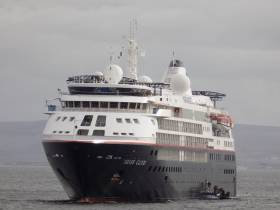Displaying items by tag: Expedition Cruising
#CruiseLiners - Ultra-luxury expedition cruiseship, Silver Cloud anchored in Galway Bay recently as part of clockwise tour of Ireland and where today the ship is docked in Killybegs, writes Jehan Ashmore.
The call off the Port of Galway on Tuesday was the second Silverseas Cruises caller. The operator’s new flagship Silver Muse made a visit earlier this month to become the first caller this season.
A flotila of the cruiseships' zodiac tenders took guests ashore to the 'City of the Tribes'. They disembarked at the port's outer pier leading to the entrance of the Dun Aengus dock basin.
Silver Cloud is a Bahamas flagged ship that at 17,014 gross registered tonnes is deemed small today in cruiseship terms, however the Monaco based operator offers luxury at the top end of the market. They have 9 cruiseships and last year the Silver Cloud was refurbished.
According to Silversea, they provide the highest space to guest and crew to guest ratios in expedition cruising. In the case of Silver Cloud there are 257 guests served by a crew 223.
Among the facilities is an explorers’ lounge, bar, boutiques, pool deck, spa, fitness centre and a photo-studio. In addition to the Connoisseur’s Corner offering cognacs and cigars for purchase.
Accommodation consists exclusively of luxurious suites where 80% of them feature verandas.
Prior to making the anchorage call off Mutton Island in Galway Bay, Afloat monitored the ice-class 157m Silver Cloud depart Pembroke Dock, south Wales having sailed from the English Channel.
The cruiseship's first destination following the call to Milford Haven estuary was in Irish waters at the spectacular backdrop of the Skelligs, Co. Kerry. This is where the cruiseship extended its role by offering guests access to 16 zodiacs.
Other water-based equipment includes 16 kayaks opening up opportunities when cruising globally to explore through greater independence.
During the cruise leg from Galway Bay to Killybegs, Silver Cloud yesterday called off the Aran Islands at Kilronan, Inishmore. The anchorage call was followed by another off Clare Island on the approaches to Clew Bay.
The 1994 built cruiseship has since docked in the Donegal port this morning.






























































